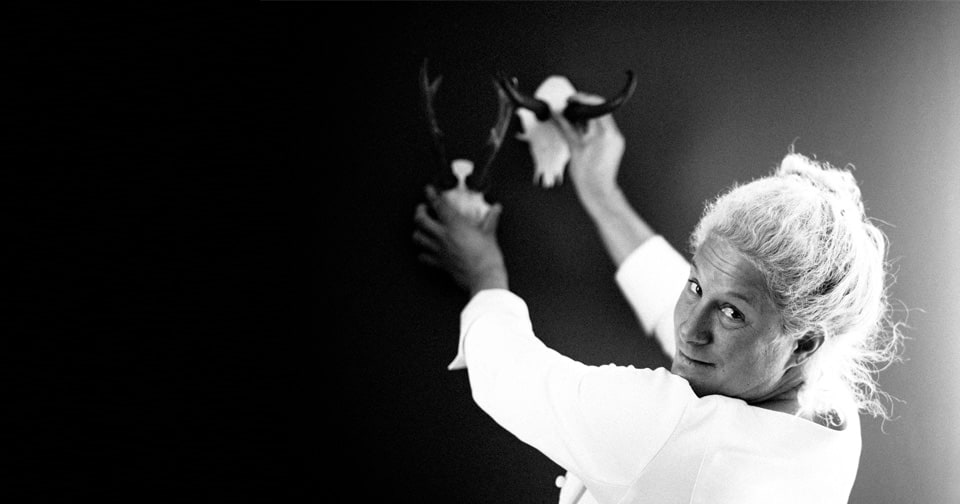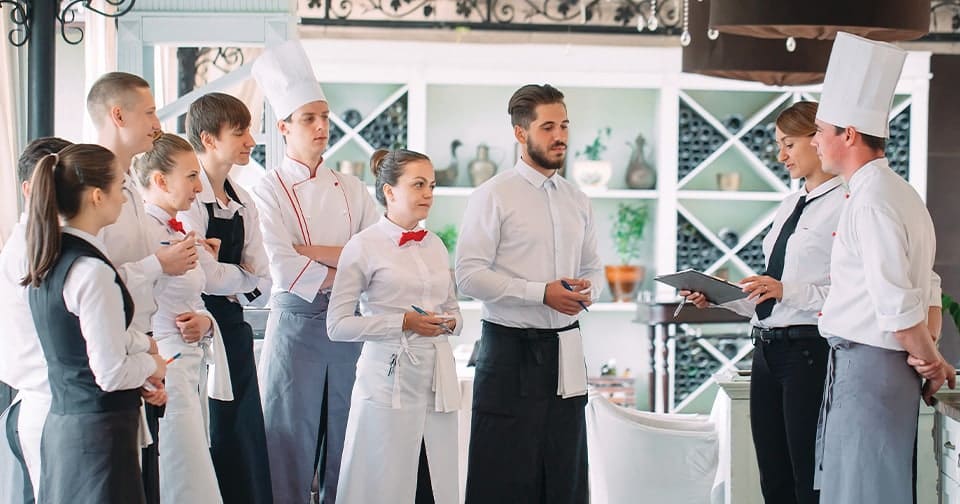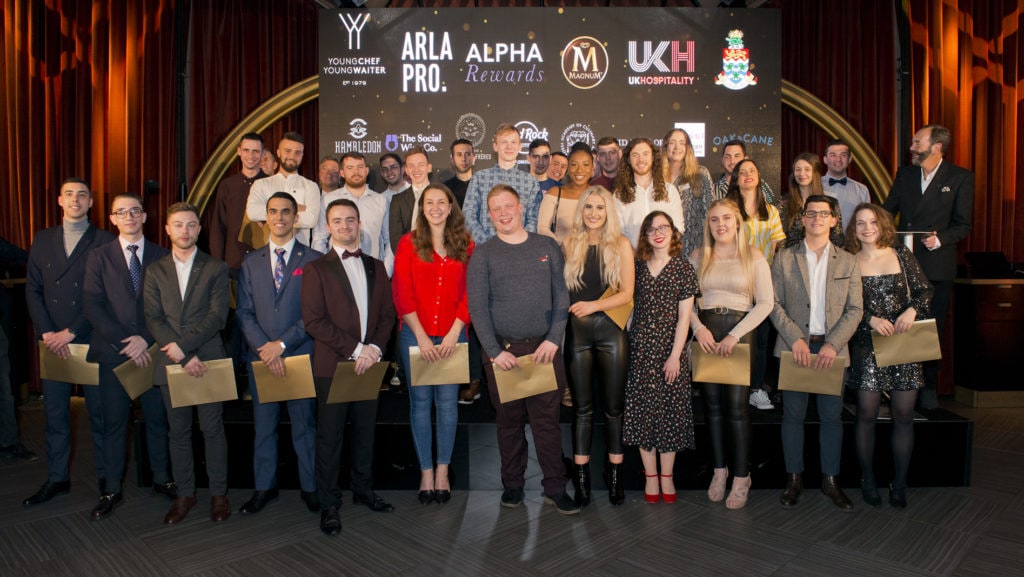
“I never had a plan for all this; I just went with the flow,” says Ana Ros. The Slovenian chef has found herself getting a lot of attention in the last four years, as her restaurant Hisa Franko has become known among food fans the world over. She has been the subject of Netflix’s Chef’s Table and this year was named the world’s best female chef. Yet on the phone from her home in Slovenia’s Soca Valley she assures me that her career in the kitchen was genuinely one without any other plan than to survive.
The entirely self-taught chef took the helm of Hisa Franko in 2002 following an unusual trajectory – even for this most unusual of chefs. Ros’s achievements include skiing champion on the Yugoslav junior national team and a degree in international relations.
It could all have been so different. Her career was meant to be in the diplomatic service, but to the disappointment of her doctor father and journalist mother she chose to stay with her husband Valter in the valley to run her recently retired in-laws’ restaurant. As she tells it in Chef’s Table, she chose love. “It is about listening to life and following where it brings you. Sometimes it can lead to very interesting decisions,” she says.
It was not an easy decision. She had a job offer in Belgium and her parents expected her to accept. “My parents kept saying, ‘did you call Brussels? Did you take the job?’ and I said, ‘yes, yes, I am calling tomorrow’ but I needed to decide for my life,” she explains. “I understand them being disappointed. Imagine coming from an intellectual family and saying you want to be a mechanic instead of a lawyer.”
To put it in context, this decision was not taken against the backdrop of adulation for chefs that we see today. Slovenia is not a traditional gastronomic destination and while it was emerging from what she describes as the “grey period of socialism where everything was the same, including restaurant menus” chefs didn’t have a prominent role in social life. “Cooking meant using your hands and not your brain. I think my parents still have this idea – they are proud, but it is difficult for them.”
Building an identity
She started working front of house in the restaurant, while Valter looked after wine, and only took control of the kitchen after a few years. “The restaurant didn’t have a proper philosophy and my husband and I understood that one of us had to take over in the kitchen. He was already in the wine business so I decided to take that challenge on,” she recalls.
The most – and likely only – well-known chef from Slovenia, Ros has acted as diplomat on a different level to the one she might have expected. Few people in the culinary world today could be oblivious to her gastronomic exploits in the remote valleys of Slovenia.
But it is true to say that the tiny country, all 21,000 sq km of it, bordered by Austria, Italy, Hungary and Croatia is still in the early days of defining its identity – culinary and otherwise – after Slovenia declared its independence in 1991. “As a nation we have existed for hundreds of years, but we belonged to different countries and now we are starting to build our own. With every step we take we need to open a new door. Nothing is organised, nothing is prepared so we have to knock on so many doors,” Ros says.
The other thing to remember, she says, is the tradition of sourcing your own produce. “Slovenia has never been a rich country so people have always foraged; they have their own gardens or farms and the food is very natural,” she says. “There is a lack of infrastructure here, that is why I am saying that cooking at a time when we are building our identity is a difficult thing. If you have to set out in a country like mine you have to work 10 times harder than a chef in the UK.”
Going local
The central European location of Slovenia, squeezed in between larger neighbouring countries, means the national cuisine is a true melting pot, with influences as varied as the Mediterranean, the Alpine lowlands and the Balkans.
Hisa Franko’s location is remote – so far away that suppliers initially refused to deliver. This forced Ros and her husband to look for produce locally and it means that 95% of the food they serve is local. “I didn’t have a big plan, but we needed to survive and we worked hard to find the quality,” she says. “We found the regional identity is so strong here that there is no need to look outside. The land and traditions give us so many different products and influences.”
The restaurant, feted by diners worldwide today, is very different from the one Ros and Valter took over from her in-laws. The menu then was heavily Italian, catering to the day-trippers who crossed the border from Italy, five kilometres away, to stock up on cheap fuel. Italians, as she came to realise, prefer Italian food.
“I love Italian cuisine, but it has such a strong identity that Italians are not curious about other cuisines – they eat Italian food even when they travel,” she says.
As Ros went about changing the menu at Hisa Franko to reflect its Slovenian surroundings, the clients stopped coming. She still reads comments from people calling the food “interesting, but strange”. She says: “My food is not strange. OK, it may not be to your taste, it is not Italian, but I am Slovenian, not Italian.”
Wide horizon
Though the local sourcing and foraging strategy was in some ways thrust upon her as a means to make the restaurant a success, Ros understood at the time that “we’d be interesting if we showcased how many interesting products we have around here”.
She describes her own cuisine as a mix of the territory, the seasons and her personality. “When I say my personality I mean all the experiences growing up and travelling that you go through and that define you,” she says. While the produce on the plate at Hisa Franko is hyper local, the inspiration is from all over the world.
Having travelled all her life, first with her parents and later with her boyfriend, then husband, she now travels with her own children – often during the two months in winter when the restaurant is closed. “I believe it is the most beautiful gift you can give a child,” she says. “It is important to have a big horizon even if you don’t use it.”
In the early days she and Valter went all over to experience the best restaurants in the world – places such as elBulli and El Celler de Can Roca. These days she prefers to stay away. “You realise that the way you think about food is being influenced and you don’t think enough yourself,” she says. “It is important your style remains your style. Sometimes when you visit a restaurant, the menu is boring because it is copied and pasted; the food is good, but doesn’t tell any stories.”
After experiencing other chefs’ food and studying what she could, working out her own style was fraught. “There was always some disaster, but when you start as a self-taught chef you need to keep going when you make a mistake,” she says. “This is why I think a lot of self-taught chefs are successful – they are not coming out of school brainwashed and trained in a certain way.”
Making her own success required discipline and motivation. “You need discipline but if there is no motivation you lose the discipline very quickly,” she says. She attributes her sense of discipline to her sports background but says it was also passed to her from her father who was very strict. The motivation is what drives her on to keep developing. “We are always learning,” she maintains. “I don’t believe in life we should ever say that we have arrived.”
She is not a fan of the celebrity chef culture – “hopefully it will soon be over,” she says. She is happy for customers to follow her and visit Hisa Franko because of what they see on TV and her profile as a chef, but she’d prefer it to be for her food. “I don’t want to be this little monkey that people travel around the world to see; I’d like them to taste the food and that is what I should be famous for, not for knowing how to speak or take selfies,” she says. “Sometimes I am so tired when I leave the kitchen I go straight to bed and the next morning people say, ‘we didn’t see you’ and that is the wrong attitude.”
Chefs, she believes, should remain “down to earth and understand that the first goal should be to make our food a pleasure”. But she agrees that the status chefs today enjoy gives them a position to change things for the better. She points to Massimo Bottura and his Refettorio restaurants for the homeless or René Redzepi and the way he has changed the way we think about food, being local and understanding territory.
So what about her own legacy? Shining a light on her country, which is so small you can drive across it in two hours. “A lot of the people who come here saw me on Chef’s Table and by following me they also discover this beautiful country and the products we have here,” she says. “This is also about economics, because buying local means you keep the money in the valley and young people have a vision of how to remain in the valley and not leave for the cities. They can see their future here.”
The best in the world
Much has been said about the World’s 50 Best Restaurants’ award specifically for female chefs – little of it complimentary. But Ros calls it a “beautiful” award.
“Women who work in kitchens have double workload. We are not only doing our work, but we also have families and husbands and maybe the household too, so the responsibility is much bigger,” she explains. “The women who do succeed make a lot of compromises and it is upsetting to think how often we feel guilty because we can’t be everywhere.”
She always feels a little bit guilty, she says, for travelling too much or spending too many hours in the kitchen or “because of a thousand things that need to be done in the home and are not”.
Does she ever wonder what life would have been like if she had followed her parents’ wishes and moved to Brussels? “Yes, it would be boring,” she says. “Diplomacy can look life changing and lifesaving but it is really bureaucratic and if you are a creative person you might change career later on.”
When asked if that means she made the right decision 20 years ago, she hesitates. “I don’t know. This work sometimes is so difficult and never-ending and it is difficult to say what you want when you are really tired,” she says. “You need to learn to run a happy life together with cooking, take time off for a holiday and good friends and a lot of laughter.”
Striking a balance between being a mother, a wife and a world famous chef is not easy. She tries to snatch two days off every month to spend with her children. This is time away from the computer and the phone; sometimes, she says, she manages to get three days, but on the third day the phone and the computer comes out. As she says, “you just can’t escape it”.
Tina Nielsen
Part of the band: Gelinaz
Ana Ros has been a member of the international chef collective Gelinaz for a few years. “We first invited her to a New York gig in 2014,” says Alexandra Swenden, one of the founders. “She was already really starting to become big at that time.”
Swenden’s Gelinaz co-founder Andrea Petrini says Ros is a natural fit. “She is part of the band because she is a great chef who happens to also be a woman. She fits perfectly because she likes to take risks, she likes to improvise, she is part of this group of nature-oriented chefs.” More than anything, says Swenden, she leaves the ego at home. “She is more and more confident but without having this ego, which makes her very Gelinaz. All these guys who are part of the band are typically super talented, have very high values and they leave their egos at home when they do a gig together. Ros is absolutely one of those kind of people – confident, but also open-minded and modest.”
Photos: Jurgen Grunwald, Suzan Gabrijan





